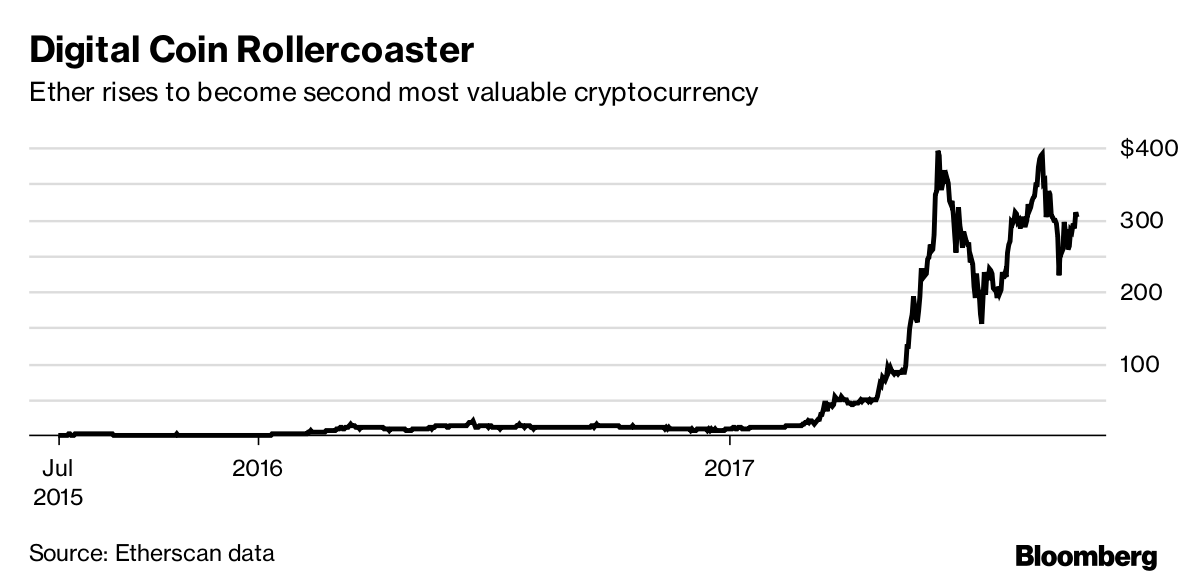
(Bloomberg) -- A popular digital-coin exchange is drawing scrutiny from U.S. regulators over a June flash crash that erased most of the value in the second-largest cryptocurrency before traders had time to blink their eyes.
The Commodity Futures Trading Commission has requested information from Coinbase Inc. about a June 21 incident on its GDAX platform in which the ether digital token suffered a precipitous drop, falling to 10 cents from $317.81 in milliseconds before quickly recovering, said two people familiar with the matter.
Among the issues the agency is focused on is what role leverage might have played in the plunge, as Coinbase allowed traders to use borrowed money to make bigger wagers than would have otherwise been possible, said the people, who asked not to be named because the review isn’t public.
The CFTC inquiry is the latest sign that federal authorities are growing worried about a market with scattershot oversight that has attracted big money. Coinbase, which says it has served 10.6 million customers and facilitated $20 billion in digital currency transactions, is regulated by various states through a patchwork system.
It’s not registered with the CFTC, the main U.S. watchdog of currency futures. Coinbase doesn’t allow traders to buy and sell derivatives, and firms don’t typically fall under the regulator’s direct jurisdiction unless they allow swaps trading. Coinbase does hold licenses with financial agencies in dozens of states, as well as Puerto Rico, according to its website.
‘Full Cooperation’
The CFTC sent San Francisco-based Coinbase a letter with a list of questions, including queries about margin trading, one of the people said. Coinbase began offering margin accounts in March, as it sought to attract institutional investors by providing them loans to amplify their bets. The company disabled the service after the June crash.
“As a regulated financial institution, Coinbase complies with regulations and fully cooperates with regulators,” the company said in an emailed statement. “After the GDAX market event in June 2017, we proactively reached out to a number of regulators, including the CFTC. We also decided to credit all customers who were impacted by this event. We are unaware of a formal investigation.”
CFTC spokeswoman Erica Elliott Richardson declined to comment.
$12.5 Million Trade
Coinbase’s ether plunge was caused by a single $12.5 million trade -- one of the biggest ever -- that prompted selling by other investors. The decline triggered automatic sell orders from traders who’d requested to bail on the currency if prices dropped to certain levels, and led GDAX to liquidate some margin trades.
While the drop was dramatic, it was also temporary. Computer algorithms quickly started issuing buy orders that drove prices back up to $300 within 10 seconds.
Bitcoin and other cryptocurrencies have surged this year. But regulators and financial executives are concerned that investors are inflating a bubble that’s destined to pop. South Korea banned margin trading in bitcoin and ether Sept. 29 after China earlier cracked down on digital currencies. Last month, JPMorgan Chase & Co. Chief Executive Officer Jamie (NYSE:JPM) Dimon likened cryptocurrencies to the infamous Dutch tulip bulb mania of the 17th Century.
Sharp Reversal
One risk of allowing margin trades is that in a sharp market reversal, trading platforms could run into problems if investors can’t repay the money they’ve borrowed.
That’s what happened in January 2015 when the currency brokerage FXCM Inc. almost toppled after Switzerland shocked markets by letting its currency appreciate. When the franc jumped, FXCM customers lost more money than they had in their accounts, forcing the company to seek a $300 million bailout from Leucadia National Corp.
Coinbase’s GDAX had a margin (NYSE:LUK)funding limit of $10,000. To qualify, investors had to meet at least one of several qualifications laid out under federal law.
For instance, individuals can only trade with borrowed money if they have more than $5 million invested in various financial markets and are using their margin accounts purely to hedge risks. Individuals are exempt from the hedging requirement if they have more than $10 million invested. The rules are looser for institutional investors, such as hedge funds and corporations.
Rising Complaints
Last year, the CFTC sanctioned a different digital token market, Bitfinex, for allowing investors who didn’t meet the $10 million threshold to make margin trades. Bitfinex also broke the law because it didn’t deliver some bitcoins that investors had bought using leverage within a required timeframe, the CFTC said. Instead, it held the tokens in accounts that it owned and controlled, according to the regulator. Bitfinex agreed to pay $75,000 to settle the case, without admitting or denying the allegations.
Coinbase has suffered outages and other performance problems as it’s struggled to handle the surge in volume that’s accompanied skyrocketing cryptocurrency prices. It has also faced a sharp increase in customer complaints. Almost 500 consumer grievances have been flagged about the company this year on a database maintained by the Consumer Financial Protection Bureau, compared with just six for all of 2016.
Coinbase and investors who use it to trade have piqued regulators’ interest in the past. In 2016, the Internal Revenue Service asked a court for permission to serve a summons against Coinbase, seeking records about taxpayers who have traded digital currencies.
It also has attracted prominent investors including Marc Andreessen’s venture capital firm and the New York Stock Exchange. In August, Coinbase received $100 million from a group led by Institutional Venture Partners, a Menlo Park, California-based venture capital firm.
